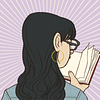Take a photo of a barcode or cover
Very dry read. Little dialogue for those used to stories driven by the dialogue but heavy scenery and inner thoughts are interesting.
”It was this moment of love, this fleeting victory over themselves, which had kept them from atrophy and extinction; which, in her, had reached out to him in every struggle against the influence of her surroundings, and in him, had kept alive the faith that now drew him penitent and reconciled to her side.”
It took me a while to get through this but man was this not a superb journey. Edith Wharton writes with the eloquence of someone to which language bows down, and the portrayal of the dark side of life in the high society of that time couldn’t have achieved a better form than the one which it assumed through her eyes and the character of Lily Bart. Considering that she was somewhat of an outsider who always managed to fit in with the rich and influential due to an extravagant taste and ambitious personality, it was all the more intense and involving to see how the trials of ladder-climbing and the judgement of other people managed, little by little, to take away from her happiness up to a point of no return. The dichotomy between solace and angst that represented her relationship with Selden was also a pretty strong aspect, and contained some of the best writing in the story as a whole. All in all, I don’t think that, before I picked this up, I’d seen such a bone-deep sad characterization of a female character from a classic novel in such a setting since Anna Karenina. Both are books you don’t easily forget.
It took me a while to get through this but man was this not a superb journey. Edith Wharton writes with the eloquence of someone to which language bows down, and the portrayal of the dark side of life in the high society of that time couldn’t have achieved a better form than the one which it assumed through her eyes and the character of Lily Bart. Considering that she was somewhat of an outsider who always managed to fit in with the rich and influential due to an extravagant taste and ambitious personality, it was all the more intense and involving to see how the trials of ladder-climbing and the judgement of other people managed, little by little, to take away from her happiness up to a point of no return. The dichotomy between solace and angst that represented her relationship with Selden was also a pretty strong aspect, and contained some of the best writing in the story as a whole. All in all, I don’t think that, before I picked this up, I’d seen such a bone-deep sad characterization of a female character from a classic novel in such a setting since Anna Karenina. Both are books you don’t easily forget.
Vanity Fair-eque but reminds me of The Jungle in how it starts out optimistic and then just gets worse and worse. Lily Bart is the anti-Jane Benet.
America and Europe of the 1800s were stiff, gilded, formal place, full of "old" families, rigid customs and social transgressions. Especially for women.
And nobody chronicled them better than Edith Wharton, who spun exquisitely barbed novels out of the social clashes of the late nineteenth century. "The House of Mirth" is one of her darker stories, where scandals and lack of conformity trigger a tragic downward spiral for a vibrant woman.
Like most not-so-rich women, Lily Bart is on the prowl for a marriage to keep her in luxury and affluent circles. What's more, she has a rapid intellect and striking looks, but she is also a habitual liar who defies society's strictures (she gambles and smokes). Her only friend is Lawrence Seldon, but she is determined not to marry for love alone.
Unfortunately, her schemes and plans start to collapse -- her adoring suitors either aren't rich enough, or her independent spirit sends her off. Her desperation becomes even more intense as she finds herself in the thick of a scandal, spun up by a malicious society matron to cover up her own affair. With her reputation in ruins, Lily's life spirals down into a new life of unemployment, poverty, and the final tragedy.
Edith Wharton always paid a lot of attention to a woman's restricted life in the Gilded Age, and how scandals, unconventionality and society's hypocrisy could ruin them. But "The House of Mirth" pays more attention to this than most -- it's a bleakly realistic story, unflinchingly showing Lily's slow descent into miserable loneliness.
Despite that, Wharton's writing is pure flowering poetry with a knack for evocation ("Her small pale face seemed the mere setting of a pair of dark exaggerated eyes"), and has a sensual quality with all the descriptions of silks, plants, soft light and luxurious mansions. And she vividly portrays the upper echelons of New York society at the time -- affairs, gossip and gilded salons -- as well as the restricted lives of women
But Wharton is just as capable of describing the darker, sadder world that Lily falls into ("... blurred the gaunt roof-lines, threw a mauve veil over the discouraging perspective of the side streets"). Sedoesn't pull any punches with the tragic finale, which has a distinct air of inevitability about it -- no fairy-tale last-minute save by a Prince Charming.
Lily starts out the book as a glimmering satellite of society, who can be rather selfish and cruel, but who nevertheless gains some sympathy for her terrible plight. The cruel, glittering society of the time had no room for women who stood outside the lines, especially if they tried to lie at all the wrong times. And so we see poor Lily, driven into miserable poverty and drug addiction.
"The House of Mirth" is anything but mirthful -- it's the study of a woman's slow downfall, and the cruel society that left her friendless and disgraced. Haunting and vivid.
And nobody chronicled them better than Edith Wharton, who spun exquisitely barbed novels out of the social clashes of the late nineteenth century. "The House of Mirth" is one of her darker stories, where scandals and lack of conformity trigger a tragic downward spiral for a vibrant woman.
Like most not-so-rich women, Lily Bart is on the prowl for a marriage to keep her in luxury and affluent circles. What's more, she has a rapid intellect and striking looks, but she is also a habitual liar who defies society's strictures (she gambles and smokes). Her only friend is Lawrence Seldon, but she is determined not to marry for love alone.
Unfortunately, her schemes and plans start to collapse -- her adoring suitors either aren't rich enough, or her independent spirit sends her off. Her desperation becomes even more intense as she finds herself in the thick of a scandal, spun up by a malicious society matron to cover up her own affair. With her reputation in ruins, Lily's life spirals down into a new life of unemployment, poverty, and the final tragedy.
Edith Wharton always paid a lot of attention to a woman's restricted life in the Gilded Age, and how scandals, unconventionality and society's hypocrisy could ruin them. But "The House of Mirth" pays more attention to this than most -- it's a bleakly realistic story, unflinchingly showing Lily's slow descent into miserable loneliness.
Despite that, Wharton's writing is pure flowering poetry with a knack for evocation ("Her small pale face seemed the mere setting of a pair of dark exaggerated eyes"), and has a sensual quality with all the descriptions of silks, plants, soft light and luxurious mansions. And she vividly portrays the upper echelons of New York society at the time -- affairs, gossip and gilded salons -- as well as the restricted lives of women
But Wharton is just as capable of describing the darker, sadder world that Lily falls into ("... blurred the gaunt roof-lines, threw a mauve veil over the discouraging perspective of the side streets"). Sedoesn't pull any punches with the tragic finale, which has a distinct air of inevitability about it -- no fairy-tale last-minute save by a Prince Charming.
Lily starts out the book as a glimmering satellite of society, who can be rather selfish and cruel, but who nevertheless gains some sympathy for her terrible plight. The cruel, glittering society of the time had no room for women who stood outside the lines, especially if they tried to lie at all the wrong times. And so we see poor Lily, driven into miserable poverty and drug addiction.
"The House of Mirth" is anything but mirthful -- it's the study of a woman's slow downfall, and the cruel society that left her friendless and disgraced. Haunting and vivid.
My rating doesn't show it, but I was kinda torn on this one. I was going between a 3 or 4, and bumped it up because it is truly a good book. But did I enjoy it? I don't know. It was really well written, the story was told beautifully, and the characters were richly developed and fascinating. My emotional reaction to Lily Bart's situation changed drastically throughout the book, and I found myself pitying her and hoping for a miraculous Jane Austen-like ending where she was saved by the true love of a kind and very rich man who respects her autonomy. I found myself liking her and hating her oppressors, so by all metrics, you'd assume I really enjoyed this book. But instead, this was one of the most depressing books I've ever read, which makes it hard to find true "enjoyment." This is the kind of novel you pick up when life sucks and you want to wallow in a situation that's really worse than yours, just to feel better about your own life, which is just sad and pathetic and depressing, and usually not something I choose to do. But, if you like despairing over a fictional character's descent from greatness, watching as she slowly but consistently fails to live up to her potential and refuses to take any actions which would improve her life - even if some of those choices might compromise her ethics - then this is the book for you. It's really great, but I just can't take pleasure in Lily's failure of a life.
DNF @ 12%. I was so incredibly bored. I might come back to this later.
Maybe I should stop trying to read books from this era, because the politics of high society bore me terribly, especially when unalleviated by a cast of sympathetic characters. It took me a very long time to even like Lily, and I don't think I empathized with her until the very end — which felt abrupt and disappointing, which I suppose could be seen as a metaphor for life; but it's not one that really appeals to me at all.
On a scale of cotton candy to Brussels sprouts, The House of Mirth by Edith Wharton is stolen starburst. This sweet, pop-in-your-mouth candy either lingers long or is gone with a quick chew. But if the candy is lost, then you never enjoy that final tastiness.
Miss Lily grew up with a disdain for plain living and a taste for luxury. Yet, she did not have enough money as an adult to live her life that way without becoming the plaything of the rich. Miss Lily chafes at her life, struggling between the question of happiness, morality, and financial means. Is she merely a pawn in the game of the rich?
I do love reading classics, but they often take more time to read due to the language and subtlety. Miss Lily held herself aloof of both readers and her peers, but her life, struggles, highs, and lows felt relatable still. The story came full circle in a way. And while there didn't seem to be much of a plot, I couldn't help but feel that Miss Lily was at the mercy of the riptide of society. Edith Wharton spun the world of Miss Lily with the prettiest and starkest word pictures, and I often grinned over them.
If you enjoy classics and have not yet read The House of Mirth, you really ought to.
Miss Lily grew up with a disdain for plain living and a taste for luxury. Yet, she did not have enough money as an adult to live her life that way without becoming the plaything of the rich. Miss Lily chafes at her life, struggling between the question of happiness, morality, and financial means. Is she merely a pawn in the game of the rich?
I do love reading classics, but they often take more time to read due to the language and subtlety. Miss Lily held herself aloof of both readers and her peers, but her life, struggles, highs, and lows felt relatable still. The story came full circle in a way. And while there didn't seem to be much of a plot, I couldn't help but feel that Miss Lily was at the mercy of the riptide of society. Edith Wharton spun the world of Miss Lily with the prettiest and starkest word pictures, and I often grinned over them.
If you enjoy classics and have not yet read The House of Mirth, you really ought to.
emotional
reflective
sad
slow-paced
Plot or Character Driven:
Character
Strong character development:
Complicated
Loveable characters:
Complicated
Diverse cast of characters:
No
Flaws of characters a main focus:
Yes






